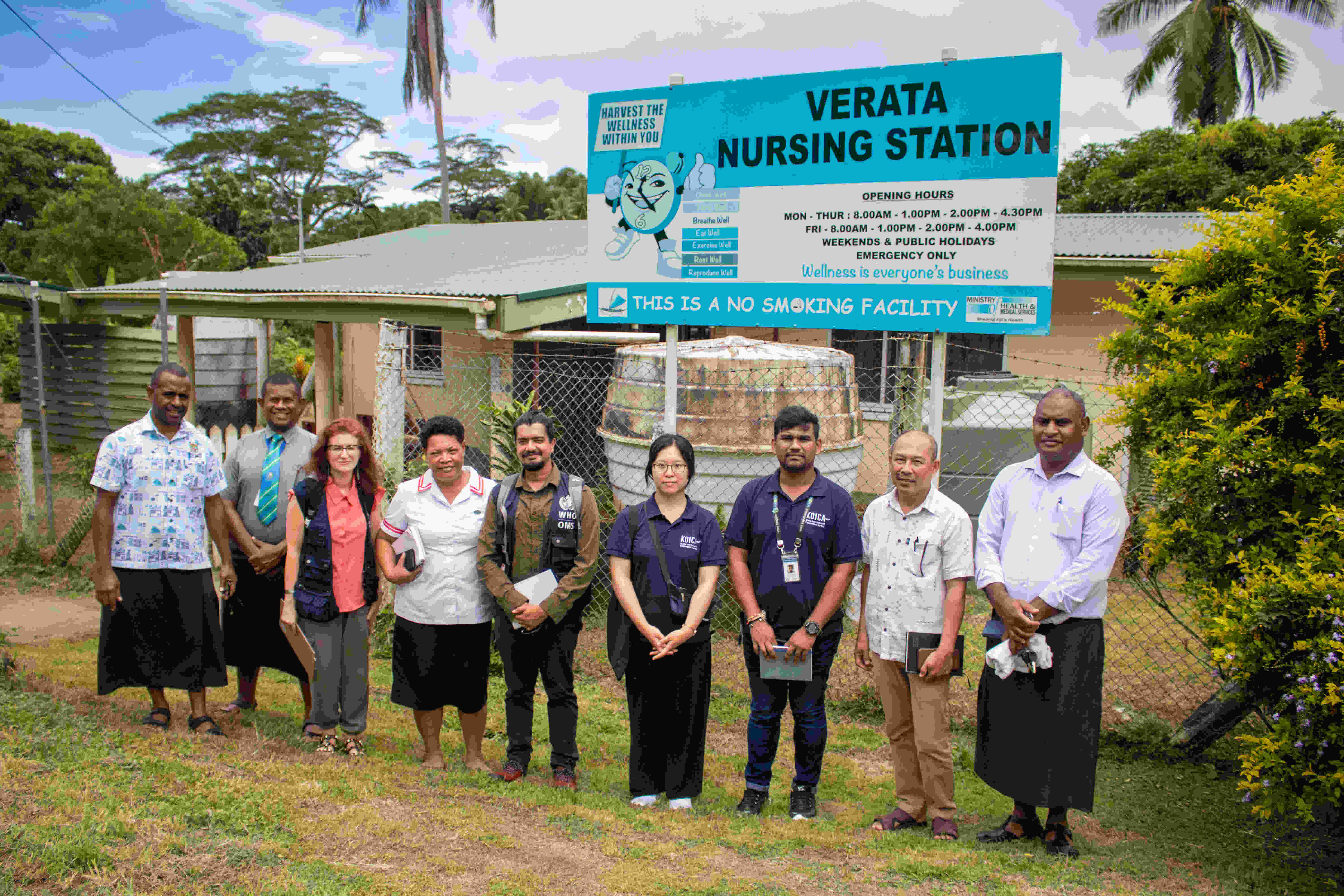REPORT 2022 - 2023
Epigraph:
Author:
- Home
- Executive overview
- Working together
- Impact on the Ground
WHO Region:Country, Territory or Area:Filter search results




- Countries enabled to provide high-quality, people-centred health services, based on primary health care strategies and comprehensive essential service packages
Enhancing Fiji's resilience to the health impacts of climate change
In recent years, Fiji has grappled with a range of climate challenges, facing cyclones, rising sea levels, unpredictable rainfall, floods, droughts, and saltwater contamination of freshwater sources. Consequently, there has been a rise in climate-sensitive diseases and increased incidence of mortality and injuries from extreme weather events. This highlights the urgent need to upgrade Fiji's health infrastructure to cope with the evolving impacts of climate change. Climate-resilient health infrastructure must be adaptable to changing disease patterns and extreme weather, provide continued access to clean water and sanitation, use sustainable energy, engage communities, and employ robust information systems. To achieve this, WHO collaborated with Fiji’s Ministry for Health and Medical Services and the Korea International Cooperation Agency (KOICA) to spearhead a climate hazard and vulnerability assessment of 204 Fijian healthcare facilities. A pioneering initiative in WHO’s Western Pacific Region, this effort identified over 50 healthcare facilities and one national laboratory in need of upgrading. These efforts aim to ensure the sustainability and accessibility of healthcare in Fiji even in the face of climate-related challenges. This aligns with Output 3.2.1 of the 2022-2023 WHO Programme Budget, the emphasis on climate resilience in “For the Future: Towards the Healthiest and Safest Region,” the WHO Country Cooperation Strategy 2018-2022: Pacific Island Countries and Areas (extended to 2023), the United Nations Pacific Cooperation Framework, 2023-2027, and the 2050 Strategy for the Blue Pacific Continent.
- Honourable Dr Ratu Atonio Rabici Lalabalavu, Minister of Health and Medical Services, Fiji

Representatives from WHO, Fiji's Ministry of Health and Medical Services, and KOICA visit the Verata Nursing Station in Tailevu Province, Fiji, to conduct a climate hazard and vulnerability assessment.
Photo credit: WHO/Faizza Tanggol
How did Fiji, with the support of WHO, achieve this?
In 2019, WHO, in collaboration with Fiji’s Ministry for Health and Medical Services, with funding from KOICA, launched the Strengthening Health Adaptation Project: Responding to Climate Change in Fiji (the SHAPE project). The project, running from 2019 to 2025 with a budget of USD 6.41 million, aims to understand the capacities and needs of communities in adapting to climate change, among other objectives. In 2022, under the SHAPE project, the Ministry of Health and Medical Services and WHO concluded a climate hazard and vulnerability assessment of 204 Fijian healthcare facilities. The vulnerability assessments aimed to identify and understand the susceptibility of healthcare facilities to the impacts of climate change, specifically pinpointing those with the highest risk. Ten criteria were used to evaluate healthcare facilities, considering factors such as workforce, electricity supply, water, sanitation, hygiene, waste management, and infrastructure, among others. More than 50 healthcare facilities and at least one national laboratory were identified as most vulnerable and high-risk. These facilities are currently being prioritized for retrofitting.
-Dr Mark Jacobs, WHO Representative to the South Pacific and Director of Pacific Technical Support
One of the facilities identified as high risk, the Verata Nursing Station, was established in 1979 and serves seven villages and settlements with a population ranging from 2 000 to 3 000 people. The district nurse and seven community health workers, each assigned to a village, cater to the healthcare needs of the entire community. However, escalating impacts of climate change, have elevated the facility's risk level. Increased river flooding has hindered accessibility. The medical team struggles with growing challenges related to transportation, resource availability, and water cleanliness, exacerbated by the area's susceptibility to drought, floods and severe landslides. During periods of low rainfall, the mains water supply is cut off, compelling the station to rely on reserve tanks to meet patient needs. To address these vulnerabilities, WHO is directing renovation efforts toward improving accessibility for individuals with mobility challenges, ensuring sustainable access to electricity from solar power, providing safe water, and upgrading sanitation facilities. The critical upgrades at the Verata Nursing Station are also being implemented in other health facilities across Fiji as part of the project.
However, improvements in health infrastructure alone will not be enough to increase the resilience of Fijian communities to the health impacts of climate change. Therefore, WHO, with funding from KOICA, crafted comprehensive training packages aimed at healthcare professionals and local communities. The training seeks to empower both health workers and community members to carry out climate vulnerability assessments in their own communities and build climate resilience into their daily lives. Additionally, WHO supported the creation and dissemination of Fiji's Guidelines for Climate-Resilient and Environmentally Sustainable Health Care Facilities, a valuable resource fostering community adaptation and skill enhancement.[1] These guidelines, derived from WHO's global Guidance for Climate Resilient and Environmentally Sustainable Health Care Facilities, mark a pioneering effort in the region. [2]
As Fiji faces increasing pressure from the climate crisis, the upgraded health facilities, an empowered health workforce, and engaged communities are crucial for protecting health during climate-driven disasters and outbreaks. The collaborative efforts of WHO and the Ministry of Health and Medical Services, with funding from KOICA, have laid the foundation for a more resilient health system in Fiji, capable of navigating the challenges posed by the changing climate.
References
- Ministry of Health and Medical Services. Guidelines for Climate-Resilient and Environmentally Sustainable Health Care Facilities in Fiji. Guidelines for Climate-Resilient and Environmentally Sustainable Health Care Facilities in Fiji, accessed 19 January 2024.
- World Health Organization. WHO guidance for climate resilient and environmentally sustainable health care facilities. WHO Guidance for Climate Resilient and Environmentally Sustainable Health Care Facilities, accessed 19 January 2024.
- Countries enabled to provide high-quality, people-centred health services, based on primary health care strategies and comprehensive essential service packages
